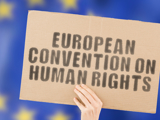Oral Justice Questions: 21-02-23
As part of the regular Justice Questions session, Justice Secretary Dominic Raab and his team of Ministers were questioned by Members of Parliament in the House of Commons on Tuesday 21 January. Issues such as leaving the European Convention on Human Rights (ECHR), the Good Friday/Belfast Agreement (the GFA, the Northern Ireland peace agreement), and victims’ rights were raised.
Withdrawal from the European Convention on Human Rights
Martin Docherty MP (SNP), Angela Crawley MP (SNP) and Alistair Carmichael MP (Liberal Democrat) submitted questions in advanced on whether the Justice Secretary had discussed the effects of withdrawal from the ECHR with Cabinet colleagues, and asked what his policy is on the future of the UK’s adherence to the ECHR. Raab’s response was simply that the Bill of Rights Bill (better known as the “Rights Removal Bill”, the potential dangerous and discriminatory impact of which you can read more about here) ‘will envisage us remaining a state party to the ECHR and fully availing ourselves of the margin of appreciation to restore some common sense to our human rights regime.’ The margin of an appreciation is a principle used by the European Court of Human Rights to allow countries a degree of flexibility in meeting their human rights duties, especially where there is a lack of consensus on a particular issue. We discuss this principle further in our Explainer on What is the Human Rights Act.
Martin Docherty MP went on to press Raab further, asking him to acknowledge that leaving the ECHR would be a breach of the Government’s obligations under the Good Friday/Belfast Agreement. This prompted Raab to reiterate a position repeated several times over the last few months: that the Government ‘would not rule out ever withdrawing from the ECHR in the future.’
Later on in the session, Raab also ignored a request from Stuart McDonald MP (SNP) to deliver an ‘unequivocal defence and a long-term commitment’ that the UK would remain a party to the ECHR. He also cited the need to ensure a ‘viable legal regime that allows us to tackle illegal immigration’. This seems to underpin the recent rhetoric against the ECHR. Raab later referred to ‘elastic interpretations’ of Article 8 (concerning the right to family life) and foreign national offenders, which you can read more about in our briefing on Article 8 and our Human Rights Act here.
Raab continued, stating the following:
'I do not think that many people take issue with the Convention. Of course, it was negotiated at a very different time and place. The real issue has been the mission creep and the expanding and elastic interpretations of the ECHR since that time. I am confident that, with the Bill of Rights, we can address that in a comprehensive way.'
This perhaps implies that if the Rights Removal Bill is enacted, Raab would not see the need to pursue withdrawal from the ECHR. However, that is not to say that other members of the Conservative Party and the Government would take a similar view. Moreover, as parliamentary time continues to tick onwards, the likelihood of the Bill’s enactment continues to diminish and, therefore, the threat of leaving the ECHR continues to grow.
This statement flags a range of issues. It suggests that the Justice Secretary may see passing the Rights Removal Bill as remedying whatever issues may lay behind calls for withdrawal from the ECHR. Even ignoring the fact there no case for withdrawal from the ECHR has been made out, this is a highly questionable linking of issues. As Parliament's Joint Human Rights Committee found in January following legislative scrutiny of the Bill:
‘[it] is likely to reduce the protections currently provided by the HRA, which some argue is the Government’s intention; to place restrictions on the interpretation and application of the rights set out in the European Convention on Human Rights (ECHR) in our domestic system; to limit the powers of the courts accordingly; and to divorce ourselves from the European Court of Human Rights in Strasbourg (ECtHR) as far as possible. Moreover, the Bill will likely see more cases going to the European Court of Human Rights, and result in more adverse judgments against the UK.’
It is worth nothing that last year there were only four cases against the UK in the Court.
The Good Friday Agreement
Alistair Carmichael MP posed the following question to the Justice Secretary: If he is not ruling out ever leaving the convention, is he then not ruling out ever breaking the Good Friday agreement? Raab responded that the Government is ‘absolutely committed to the Good Friday agreement and the stability of Northern Ireland’.
Steve Reed MP (Labour Shadow Justice Minister) went on to state that the Rights Removal Bill 'will mandate British courts to override the European convention on human rights in certain circumstances and restrict access to Convention rights through British courts, but the Good Friday Agreement guarantees direct access to the courts for any breaches of the convention.'

He therefore asked how Raab will achieve his plans without breaching the Good Friday Agreement.
Raab responded that because the ECHR is retained within a schedule to the Rights Removal Bill, 'we can remain absolutely committed to the Good Friday Agreement.'
As our summary of the recent Northern Ireland Affairs Committee Oral Evidence Session in Parliament on the Bill of Rights Bill shows, experts have highlighted how the Bill does, in fact, raise a number of concerns for people in Northern Ireland and the ongoing peace process. These concerns exist despite the inclusion of the ECHR as a schedule to the Bill.
Strengthening Human Rights
SNP MPs Alison Thewliss and Hannah Bardell submitted a question regarding whether the Justice Secretary had had recent discussions with Cabinet colleagues on strengthening human rights. Raab responded, ‘[w]e introduced the Bill of Rights to this House, which will limit the abuse of human rights and restore some common sense.’
Alison Thewliss then highlighted that human rights are for us all (you can read more about this concept of universality in our Explainer) and that withdrawing from the ECHR would threaten marginalised communities, including the LGBTQ community. Raab responded by pointing to the fact that ‘this Government introduced single-sex marriage (…) and there is nothing in our reforms that would undo the important work we have achieved’.
Hannah Bardell later drew attention to the that the UK Government should not pursue reform of the Human Rights Act 1998 without the consent of the devolved nations. Raab then remarked that as follows:
‘[t]he hon. Lady will be shocked to know that I did not agree with all the contents of the JCHR report, but I refer to the statements we have made on how we have approached the devolved Administrations. I have personally been to all the nations of the United Kingdom to speak to not only politicians and Government officials, but academics and practitioners. We will continue that engagement and I am sure we will get the right thing for all people and all citizens of the UK.’

Our series on Why Our Human Rights Act Matters, is composed of blogs from a range of groups in devolved nations, including the Human Rights Consortium of Scotland, who conclude ‘So why does the Human Rights Act matter to people in Scotland? Because people do, and without the Human Rights Act many people simply would not have a voice.’
Victims in the Criminal Justice System
Raab’s team of Ministers were also questioned on the steps they are taking to support victims in the criminal justice system. Edward Argar (Minister of State at the Ministry of Justice) responded that the Government intends to bring the draft Victims Bill to the House of Commons ‘when parliamentary time allows’ and that the Bill ‘is a priority’ for the Justice Secretary. However, it is difficult to square a so-called prioritisation of the Victims Bill, whilst also seeking to push through the Rights Removal Bill. This is because the Rights Removal Bill will decimate the positive obligations which currently protect victims, particularly women and girls who are victims of domestic violence.
What Can You Do?
There is a view that because the Rights Removal Bill has not had its next stages scheduled yet that the risks it poses to people’s human rights have been reduced. However, until the Rights Removal Bill is formally withdrawn from parliament, it remains a live threat. Leaving the ECHR is also now an additional concern which the Justice Secretary failed to rule out in his response to the above questions.
It is vital that people hold Government to account. You can write to your MP using this template letter today and tell them why they must resist the Rights Removal Bill, stand firm on our Human Rights Act, and ensure our continued membership of the European Convention on Human Rights.
Related topics
Stay up-to-date
Get our newsletter
Get monthly updates on UK human rights law and our work, resources and events sent straight to your inbox.




About the author
Louise
Parliamentary & Policy Assistant